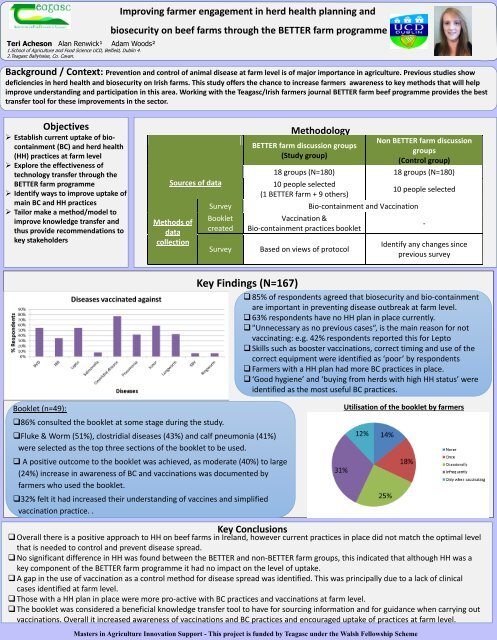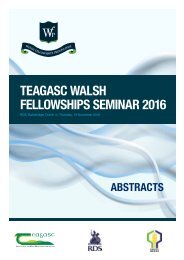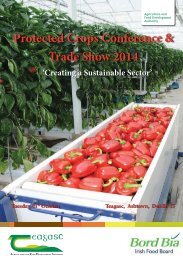Driving Farm Innovation through Knowledge Transfer
1S93ppX
1S93ppX
You also want an ePaper? Increase the reach of your titles
YUMPU automatically turns print PDFs into web optimized ePapers that Google loves.
Improving farmer engagement in herd health planning and<br />
Teri Acheson Alan Renwick¹<br />
biosecurity on beef farms <strong>through</strong> the BETTER farm programme<br />
Adam Woods²<br />
1.School of Agriculture and Food Science UCD, Belfield, Dublin 4.<br />
2.Teagasc Ballyhaise, Co. Cavan.<br />
Background / Context: Prevention and control of animal disease at farm level is of major importance in agriculture. Previous studies show<br />
deficiencies in herd health and biosecurity on Irish farms. This study offers the chance to increase farmers awareness to key methods that will help<br />
improve understanding and participation in this area. Working with the Teagasc/Irish farmers journal BETTER farm beef programme provides the best<br />
transfer tool for these improvements in the sector.<br />
Objectives<br />
‣ Establish current uptake of biocontainment<br />
(BC) and herd health<br />
(HH) practices at farm level<br />
‣ Explore the effectiveness of<br />
technology transfer <strong>through</strong> the<br />
BETTER farm programme<br />
‣ Identify ways to improve uptake of<br />
main BC and HH practices<br />
‣ Tailor make a method/model to<br />
improve knowledge transfer and<br />
thus provide recommendations to<br />
key stakeholders<br />
Sources of data<br />
Survey<br />
Booklet<br />
Methods of<br />
created<br />
data<br />
collection<br />
Survey<br />
Methodology<br />
Non BETTER farm discussion<br />
BETTER farm discussion groups<br />
groups<br />
(Study group)<br />
(Control group)<br />
18 groups (N=180) 18 groups (N=180)<br />
10 people selected<br />
(1 BETTER farm + 9 others)<br />
10 people selected<br />
Bio-containment and Vaccination<br />
Vaccination &<br />
Bio-containment practices booklet<br />
-<br />
Based on views of protocol<br />
Identify any changes since<br />
previous survey<br />
Key Findings (N=167)<br />
85% of respondents agreed that biosecurity and bio-containment<br />
are important in preventing disease outbreak at farm level.<br />
63% respondents have no HH plan in place currently.<br />
"Unnecessary as no previous cases“, is the main reason for not<br />
vaccinating: e.g. 42% respondents reported this for Lepto<br />
Skills such as booster vaccinations, correct timing and use of the<br />
correct equipment were identified as ‘poor’ by respondents<br />
<strong>Farm</strong>ers with a HH plan had more BC practices in place.<br />
‘Good hygiene’ and ‘buying from herds with high HH status’ were<br />
identified as the most useful BC practices.<br />
Booklet (n=49):<br />
Utilisation of the booklet by farmers<br />
86% consulted the booklet at some stage during the study.<br />
Fluke & Worm (51%), clostridial diseases (43%) and calf pneumonia (41%)<br />
were selected as the top three sections of the booklet to be used.<br />
A positive outcome to the booklet was achieved, as moderate (40%) to large<br />
(24%) increase in awareness of BC and vaccinations was documented by<br />
farmers who used the booklet.<br />
32% felt it had increased their understanding of vaccines and simplified<br />
vaccination practice. .<br />
Key Conclusions<br />
Overall there is a positive approach to HH on beef farms in Ireland, however current practices in place did not match the optimal level<br />
that is needed to control and prevent disease spread.<br />
No significant difference in HH was found between the BETTER and non-BETTER farm groups, this indicated that although HH was a<br />
key component of the BETTER farm programme it had no impact on the level of uptake.<br />
A gap in the use of vaccination as a control method for disease spread was identified. This was principally due to a lack of clinical<br />
cases identified at farm level.<br />
Those with a HH plan in place were more pro-active with BC practices and vaccinations at farm level.<br />
The booklet was considered a beneficial knowledge transfer tool to have for sourcing information and for guidance when carrying out<br />
vaccinations. Overall it increased awareness of vaccinations and BC practices and encouraged uptake of practices at farm level.<br />
Masters in Agriculture <strong>Innovation</strong> Support - This project is funded by Teagasc under the Walsh Fellowship Scheme




